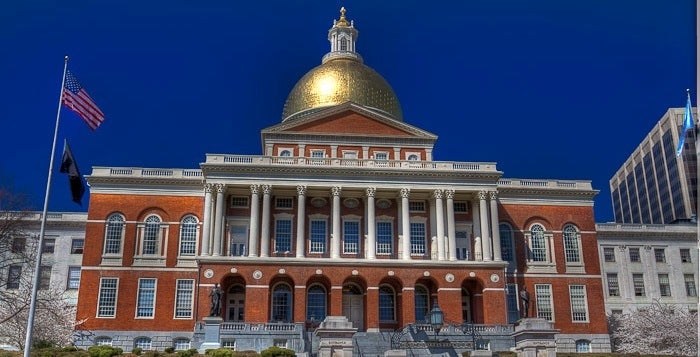Baker stopped "nonessential" spending in April

Gov. Charlie Baker and his team have been careful in recent months not to specify how he's managing state spending to deal with tax revenues that are now running nearing half a billion dollars behind estimates, saying only that he's "working the edges" of the fiscal 2017 budget and trying to balance it by June 30 through "nipping and tucking."
Democratic legislative leaders, who hold super-majorities in both branches and are usually fiercely protective of their spending priorities, have largely hidden laid back, quietly letting Baker do the dirty work of bringing their budget in balance.
The News Service has learned a touch more about the governor's approach after requesting any memos or emails the governor's budget office issued to agency heads this fiscal year containing information about how to manage spending while revenues were missing benchmarks.
In addition to previously disclosed hiring restrictions that Baker put in place last July, the News Service learned that the administration in April put the clampdown on certain spending it deemed "nonessential."
In an April memo to Cabinet secretaries, department heads, and chief financial and procurement officers, Administration and Finance Secretary Kristen Lepore wrote, "As we approach the end of the fiscal year, we must work together to ensure that we end the year in balance. In order to maximize reversions, I am once again suspending spending for nonessential goods and services."
Reversions are funds left unspent in agency and department budgets at the end of the fiscal year that revert back to the state's General Fund and become available to cover expenses in areas of state government beyond what they were initially allocated for.
The memo cracking down on spending was issued Monday, April 24, the same day the House began tacking on spending to a more than $40.3 billion budget for next year - fiscal 2018 - that even legislative leaders now acknowledge will need to be pared back because its revenue assumptions are likely to exceed actual growth over the next 12 months.
The private directive from the Baker administration demonstrates how public officials can sometimes stick with relatively meaningless rhetoric even long after they've actually taken substantive, impactful action regarding taxpayer's money.
On April 25, asked about budget troubles, Baker told reporters in Dorchester that "folks around the administration are making what I would describe as reasonable and appropriate plans" to address revenue shortfalls, but didn't mention the spending bans that were ordered a day earlier.
After declining April revenues deepened state budget problems, Baker said on May 4 that his spending management preserved "investments in local communities and in local aid and in a lot of the critical programs that matter to people." He told reporters, "The April results have been out for a day. Why don't you give us a couple more to figure out what the next move is."
On May 5, Lepore declined to offer any information about how the administration was dealing with the growing revenue shortfall. "We've already commented," she said before stepping on an elevator with other Cabinet secretaries.
Under Lepore's order, spending for nearly the past two months has been banned across eight so-called "object classes," shedding some insight into how the governor has quietly choked off spending in recent months after coming under fire in December for publicly outlining slashed programs and services.
The classes of banned spending include information technology, an area Baker has since highlighted as so critical in the modern era that he's proposing to form a new secretariat to focus on it.
The administration through May and June has also forbidden state spending on equipment purchases, consultant service contracts, administrative expenses, and "programmatic operational expenses," according to the Lepore memo.
The memo listed as possible examples of banned spending "the purchase of supplies to rebuild inventory, prepaid postage, special projects that are not time-sensitive, and computer and telephone upgrades that are not critical to operations."
Asked for examples of spending that have actually been put on hold and for an estimate of savings to date, a Baker administration spokeswoman declined to offer specifics.
"We are closely monitoring this ongoing exercise, and can share more details as savings become finalized," budget office spokeswoman Sarah Finlaw said.
House Speaker Robert DeLeo said this month that he did not know how Baker is balancing this year's budget and Senate President Stanley Rosenberg also said he was not sure, but that he hoped Baker would eventually explain his tactics.
"His job is to manage the budget, and I am confident that he will share his plans as soon as he has them available," Rosenberg said in a Boston Herald Radio interview on June 8. "So that's his job, and we'll work with him, but I'm hoping and looking forward to getting some more information soon."
The same day, Baker said funding allocated in the budget is regularly left unspent at the end of the fiscal year and said information about unspent funds would be available later in the year in the state's annual financial statement.
"The year doesn't end until the year ends, and we won't know the actual revenue picture until the year ends. And we've been planning for this accordingly for the better part of the past three or four months. And it's no secret that every year for a whole variety of reasons, hundreds of millions of dollars don't get spent. That's been true since I worked in state government in the 1990s," Baker said. "When you have a budget that's worth tens of billions of dollars, things happen over the course of the year, and as a result of that dollars either get unallocated or unspent."
Baker did not mention his administration's directive to agency heads to "maximize reversions."
"The CAFR's going to tell you what we spent our money on, which is what it always tells us. And that's standard operating procedure," Baker said June 8. He said, "And every year there are reversions. Every single year. And every year there are hundreds of millions of reversions, because that's kind of the way standard operating procedure works on a $40 billion document."
Baker and legislative leaders are scheduled to meet privately Monday at 2 p.m. in Rosenberg's third floor State House office.









0 Comments